Example

01
2023.05.10
Toward the activation of SDG activities at the Shikata Campus
Department of Nursing, Faculty of Health Sciences, Medical SchoolShota Morimoto
01
Profile
Graduated from Tokushima Bunri Senior High School
Okayama University SDGs Ambassador Member of “Copain”, a university approved organization
I also participate in about eight other clubs and activities, including a judo club, an art club, and a business club.
(Photo: 2nd from right)
In this edition of SDG Persons, we interviewed Shota Morimoto, a member of "Copain," the Okayama University SDGs ambassador university-approved organization. Copain has launched the "Beautiful Campus Project" to promote SDG activities on the Shikata Campus. The "Beautiful Campus Project" received the Encouragement Award of the Okayama University SDGs President Award for FY 2022. For more details, please click here.
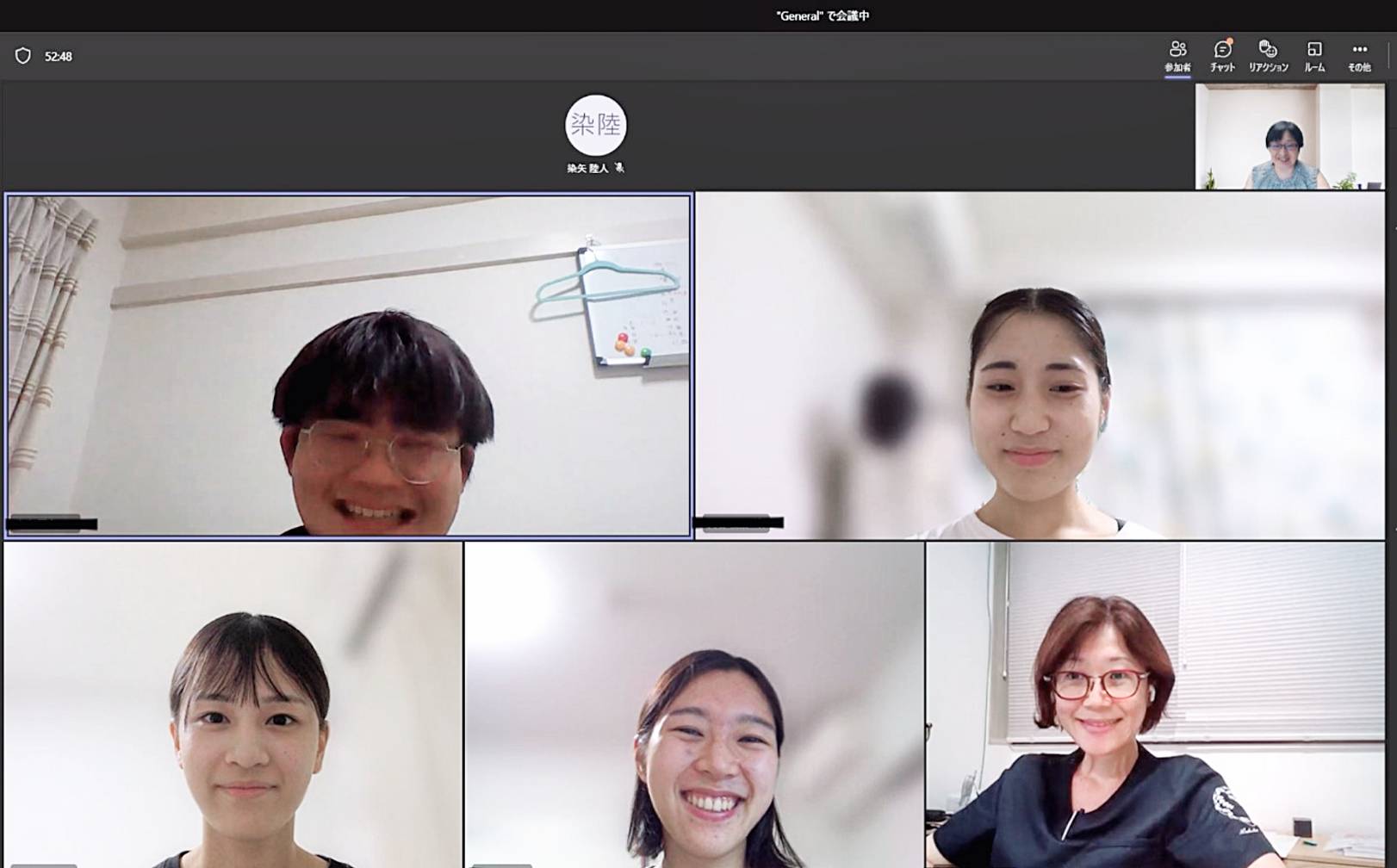
Online Meetings
――First of all, please tell us about the activities of Copain, the university approved organization of Okayama University SDGs Ambassador.
Copain started its activities in December 2021 with five members of the Faculty of Health Sciences, and has been developing its activities in many directions, starting with the "Beautiful Campus Project" launched with the desire to activate SDG activities on the Shikata Campus as on the Tsushima Campus. As of March 2023, there are a total of 13 members: 10 students from 3 majors (Nursing, Radiological Technology, and Medical Laboratory Science) in the School of Health Sciences, and 3 faculty members who participate as advisors (Professor Satoshi Hirohata, Dean of the Graduate School of Health Sciences, Professor Mori in the School of Health Sciences, and Professor Harada in the School of Interdisciplinary Science and Engineering in Health Systems)! In addition to monthly meetings, Copain members keep in touch with each other on a daily basis to plan projects and invite each other to volunteer. Last year, we created posters to prevent COVID-19 infection and to promote blood donation, discussed the importance of water using "WOSH," a circulating hand washing station donated to the university by WOTA, a company that has been sincerely addressing contemporary water issues, and participated in a reconstruction support festival in Mabi Town and an event organized by NPO "Dappi". We are actively participated in a wide range of activities.
――Thank you very much. Mr.Morimoto, please tell us why you joined Copain.
Because Copain is not a single, limited effort, but a wide variety of activities, and I felt that it was a good fit for me. To be honest, I did not engage in any social contribution activities during my elementary, junior high, and high school years, and if I had to say, the biggest social contribution I did was donating the change from my purchases at convenience stores to a donation box and greeting people in my community. When I traveled to Tokyo and Osaka after graduating from high school, I noticed many people doing various volunteer activities. At first, I was just impressed, "Wow, how can you do that?" But gradually, I began to think, "I want to be on the volunteer side, too, and be of service to others". I decided to volunteer when I entered university, and since Okayama University is famous for SDGs, I decided to join an organization that was involved in SDG activities. However, when I searched the Internet before entering the university, activities in the Shikata area did not come up in the results, so I considered joining an organization in the Tsushima area, but most of them were focused on a single goal, and I did not think I would be able to achieve my goal of "wanting to do a wide range of activities. This is because the SDGs do not have a single goal, but rather, all people, things, and the environment are intertwined and related, and a balanced consideration of all of them is necessary. When I was thinking about going it alone, I was introduced to the activities of Copain at the orientation for new students in the class of 2022 and thought, "This sounds fun! I can do what I want to do!" I felt that and I decided to join Copain. Now, thanks to the members of "Copain", the faculty, the people involved in Okayama University, and all the people I have met so far, I am able to do what I want to do, more than ever before, and I am having a great time.
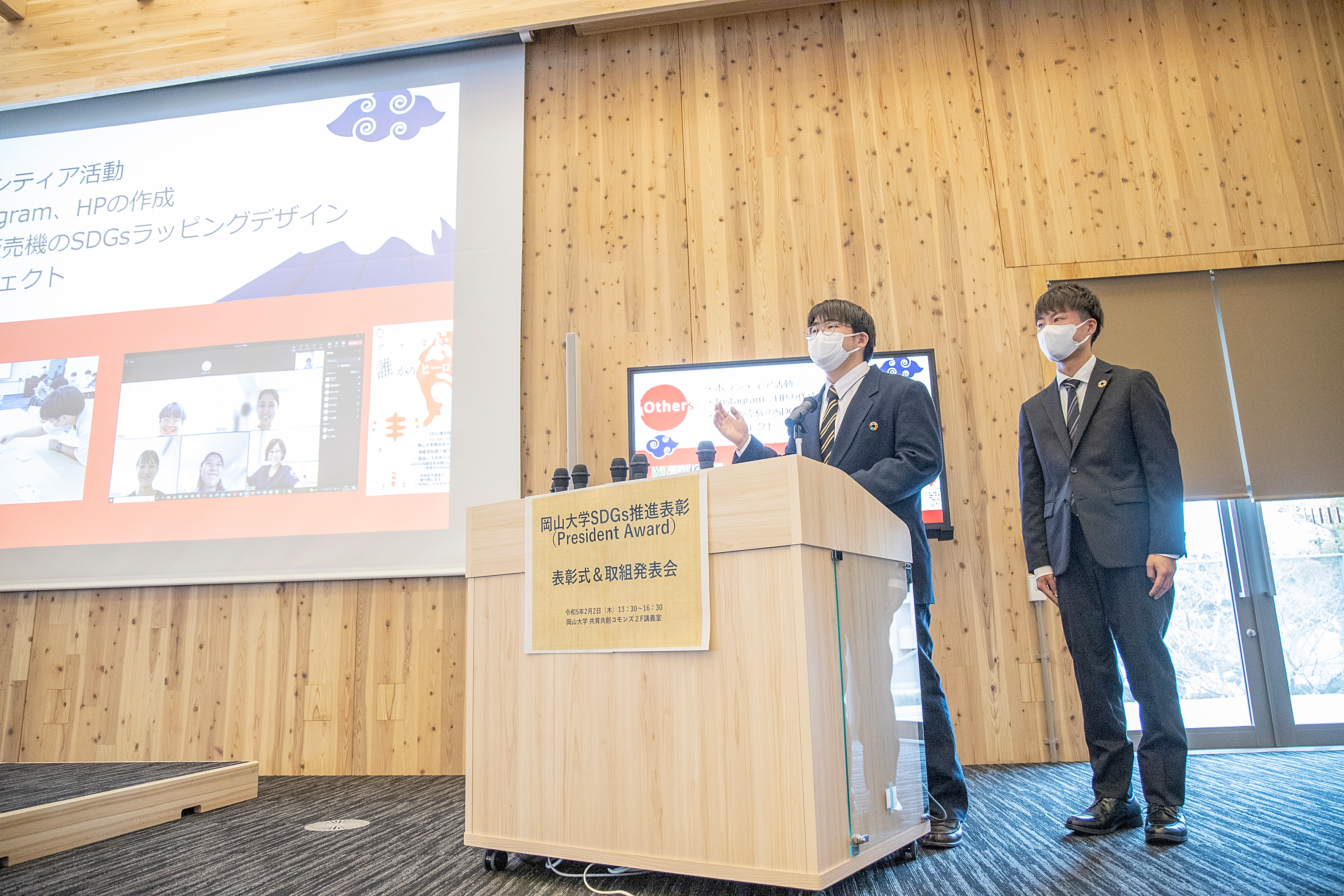
Mr. Morimoto presenting on the "Beautiful Campus Project
――What kind of activities is the "Beautiful Campus Project"?
Compared to the Tsushima area, the Shikata area is not as active in SDG activities, so we launched the "Beautiful Campus Project" in order to revitalize it, and we are continuing our activities on a daily basis. A "beautiful campus" means "a campus that is harmonious and pleasant for students to study there, and where students' minds and attitudes are favorable and idealistic toward a sustainable society. I interpret this in my own way in my "Copain" activities. People cannot be kind to others unless they have a certain amount of room in their hearts and minds. Therefore, I believe that if people have a relaxed and relaxed mind, social harmony will be achieved, and I believe that the "Beautiful Campus Project" is to support and encourage such a relaxed and relaxed mind.
Our goal in promoting the "Beautiful Campus Project" is to raise awareness and interest in the SDGs, which we believe will help people realize that they themselves are a part of society and act with a broader perspective.
There were three main activities conducted in the last fiscal year: first, we distributed e-mails and made posters targeting thorough preventive actions against COVID-19 infection at the Shikata campus; second, we conducted an educational activity using "WOSH," a water reuse hand-wash stand that can be installed in places without water, to reflect on the "importance of water" and The third activity was a blood donation drive, which is important as a foundation to support medical care.
――What did you do to make the poster for the call for prevention of COVID-19 infection?
The content of the poster was carefully considered so that it would be read by everyone, while showing concrete numbers of infected people and providing evidence, and also emphasizing the student's perspective. For example, instead of a one-sided appeal to prevent infections, we included a statement of the students' true feelings, such as "I am tired of living a life of self-restraint..." and "Thank you for your cooperation in preventing infections" to express their appreciation for the daily practice, and we aimed to create a poster that would be sympathetic to the students. The posters were distributed on the Okayama University website, in the Health Sciences Building, and on digital signage in the Shikata area, so that students would have as many opportunities as possible to see them. We learned about risk communication from our professors, and while thinking about it in our own way, we made these posters with a message that would resonate with students by keeping in mind the points to be considered.
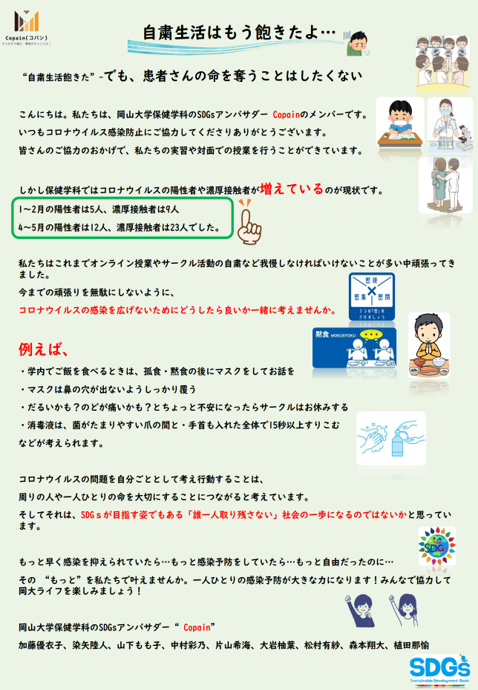
the poster for the call for prevention of COVID-19 infection
――What is the "WOSH" a water reuse hand-wash stand?
It is a hand washing device that can be installed in places without running water with a single electrical outlet and circulates over 98% of the water used, on the spot, to wash hands and sterilize smart phones. This is currently located in a lab room on the 4th floor of the Health Sciences Building, so you may have seen or used it in your training. It is interesting that smartphones can be sterilized together, and I personally appreciate that it is useful in preventing COVID-19 and other infectious diseases.
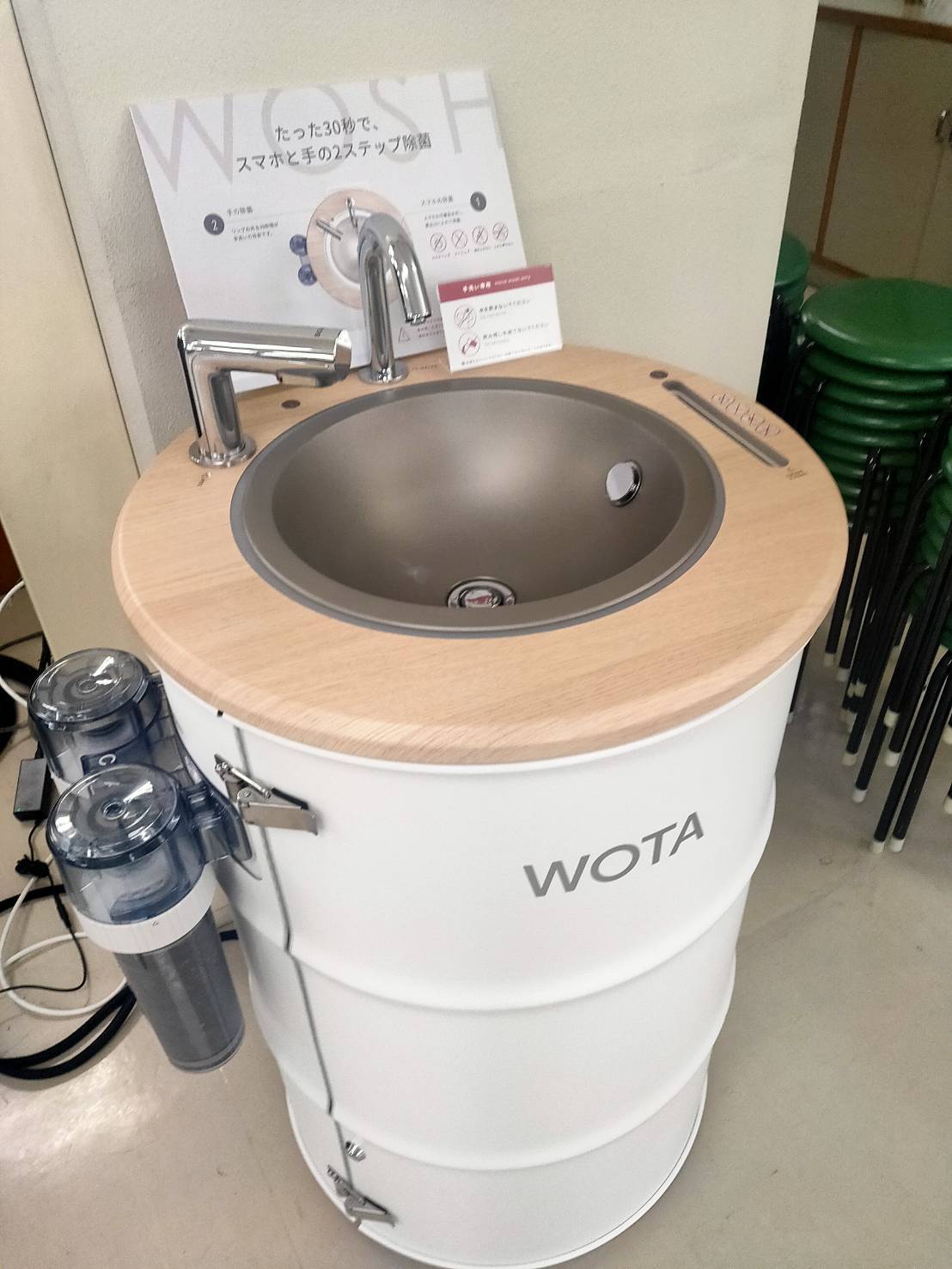
the "WOSH" a water reuse hand-wash stand
――Why did you want to use WOSH?
There are two reasons; the first is to have access to clean water in times of disaster. During a disaster, there is an increased risk of infection and contamination because sanitary water is not available and people have more opportunities to wash their hands and eat with dirty water. "WOSH" is a stand-alone device that produces clean water as long as it has a power source, making it suitable for use in the event of a disaster.
Secondly, by using "WOSH," we want to make the issue of water, a precious resource, a personal matter for all of us and achieve Goals 6: "Clean water and sanitation. There are regions of the world that do not have access to clean water and are unable to prevent various infectious diseases due to washing hands with dirty water, while there are also numerous water problems, such as the use of large amounts of water in the production of denim. We hope that the installation of WOSH will help people learn about the world's water shortages, and encourage them to think again about the importance of using finite water carefully. WOSH has not yet been featured at any events, but we hope to use the WOSH at events for new students and other projects in the future to bring attention to infection prevention measures and the water issues facing the world.
――Please tell us about your blood donation activities.
To spread the word about blood donation activities, we first made an appeal on Instagram and bulletin boards. In particular, since our age group has the highest number of traffic accidents, we used blood donation promotional posters to call attention to the need for blood and why it is important to donate blood, including as a reminder of traffic accidents.
On September 13, 2022, the Okayama Red Cross Blood Center provided us with a blood donation bus and we were able to hold our own blood donation drive, which resulted in 31 people donating their blood. The fact that so many people were able to donate blood smoothly and without confusion was due to the efforts of the Student Blood Donor League, which called out for blood donations and helped with the reception desk. Blood donation is the foundation that supports medical care, and we consider it to be very important. If there is a shortage of blood donations, it is impossible to ensure safe medical care. As blood donors, it is important for us to recognize that we can play a part in supporting the medical field, and I strongly hope that we can continue to communicate the importance of blood donation in the future.
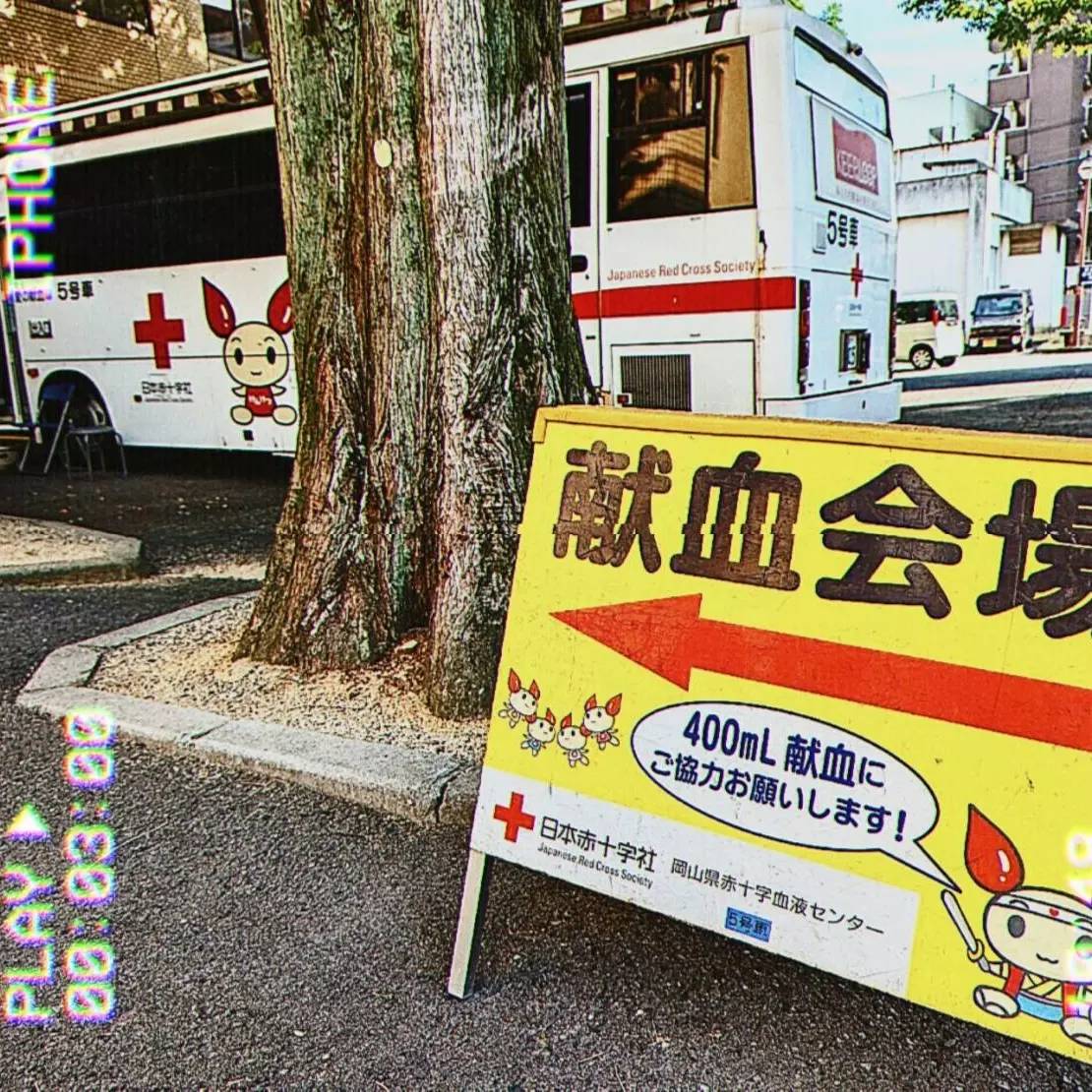
blood donation activities
――Why have you been able to engage in a variety of activities?
We have been able to promote various activities smoothly thanks to the knowledge and support of Professor Satoshi Hirohata, Dean of the Graduate School of Health Sciences, Professor Keiko Mori of the School of Health Sciences, and Professor Nahoko Harada of the School of Interdisciplinary Science and Engineering in Health Systems, who have joined "Copain" as our advisors. Thanks to the warm patronage of these professors and the outpouring of help and support, we have been able to do what we want to do, and we are truly grateful for their support. Currently, we are working with Professor Hirohata on a project to wrap the vending machines on the 4th floor of the Health Sciences Building with SDGs, and with Professor Mori on further plans to "Gardening and Maintenance" the area around the Health Sciences Building. We are working together with high school students to select flowers for this gardening project as a form of high school-university collaboration, and we are enthusiastically encouraging them to join us in planting and working together to improve our environment.
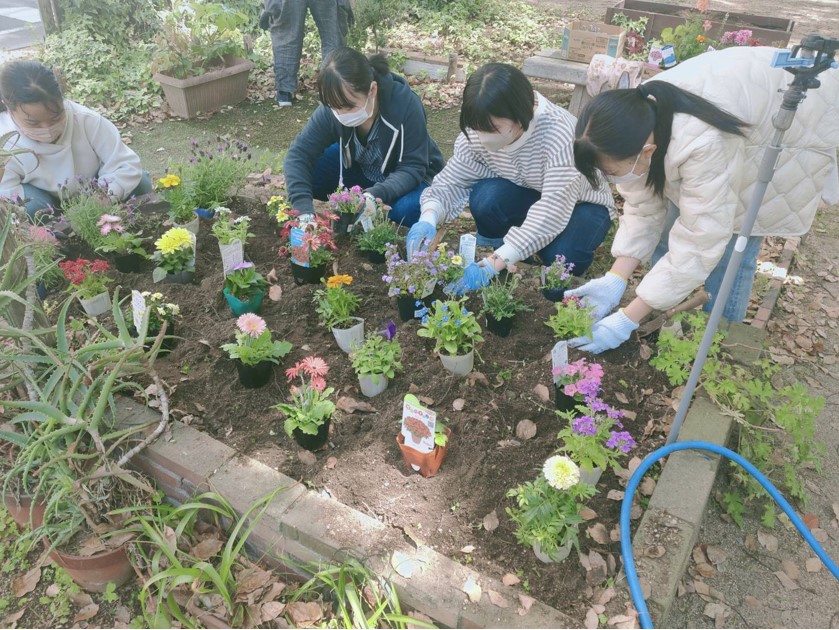
Maintenance around the Health Sciences Building
――Why with a high school student?
I believe that high school students are the brightest of all ages. I am interested in what high school students are doing in this sparkling, limited, and irreplaceable time that will determine the direction of their future lives. In addition, when I was a high school student, I was approached by a university student who knew something I did not know and whom I admired, and I have been longing for a place where I could engage in some kind of activity that would provide an opportunity to find an answer to the unidentified sense of dynamism in my heart. So, we are now calling on high school students in the hope of providing such a place for them. Talking with active high school students inspires us to do our best.
――I am very much looking forward to seeing the Shikata Campus becoming more beautiful in the future. How do you feel after the "Beautiful Campus Project" received the Encouragement Award of the FY2022 Okayama University SDGs President Award?
The first thing I felt was happiness. I was honestly happy that we were recognized, and originally, the purpose of our "Copain" project was to "spread and activate the SDGs in the Shikata area. I was happy to see that we are getting closer to achieving our goal. Also, at the award ceremony, I was greatly inspired by hearing about SDG activities at Okayama University, which I had never heard of before. It was a wonderful experience, and it inspired me to take on the next round of activities. I am filled with gratitude to all of you.
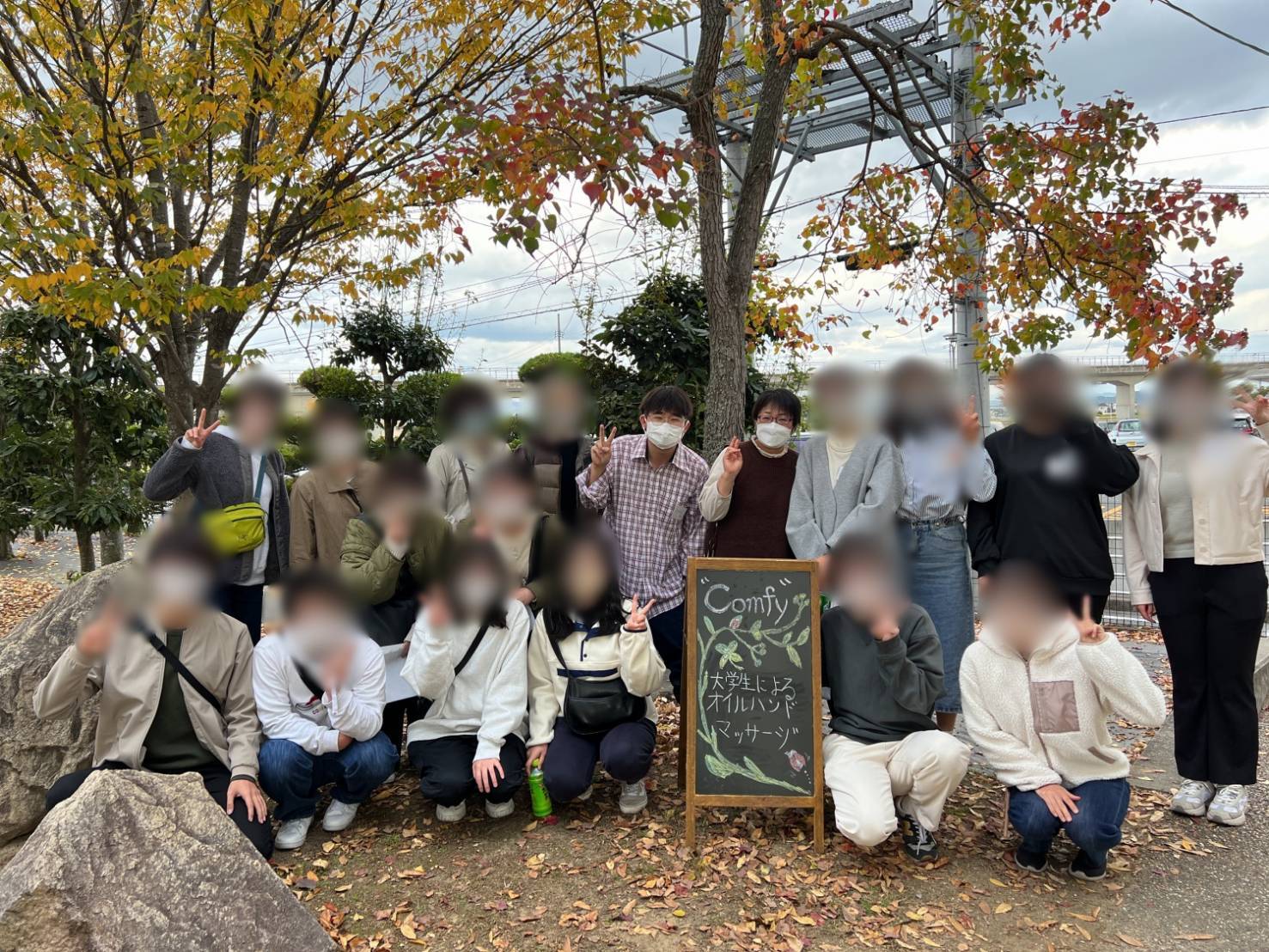
the reconstruction support festival in Mabi Town
――Among the various activities you have been involved in, are there any activities that stand out for you?
Through the accumulation of activities at Copain, I have met a wide variety of people and am constantly learning and growing, so everything is impressive to me, but the one that immediately comes to mind is my participation in the reconstruction support festival in Mabi Town. At that time, due to the outbreak of COVID-19 infection, thorough precautions were taken to prevent the spread of infection on the medical school campus, making it difficult to conduct activities outside the campus, and there were few activities that involved dialogue with people other than Copain members, but this project was the first time I engaged in activities while interacting with local people. During the reconstruction support festival, we received words of thanks from various people, and they expressed their feelings toward the region, and for the first time since I entered Okayama University, I felt that I was being of use to others. Until then, it had been difficult for me to realize whether the number of people participating in our activities and the results of those activities were truly useful, and I was concerned that it was a one-way street on our side, but this activity in Mabi Town seemed to have cleared up the blur.
I also participated in a workshop on the SDGs, and as I listened to a wide variety of people's activities and thoughts on the SDGs, I felt my perspective gradually broaden. My own way of thinking became more flexible through the contact with everyone, and I felt as if I had solved a difficult problem and cleared up a lot of confusion that I had been feeling.
――What do you value in your relationships with various people?
It is to accept the person as he or she is, without denying or discriminating against them, saying, "There are people who think like this," or "There is such a way of thinking". By doing so, the prejudices and stereotypes I had have changed dramatically, my perspective has broadened, and I am now able to see things from multiple perspectives. I enjoy it very much because I can come up with new things I want to try and broaden the scope of my activities.
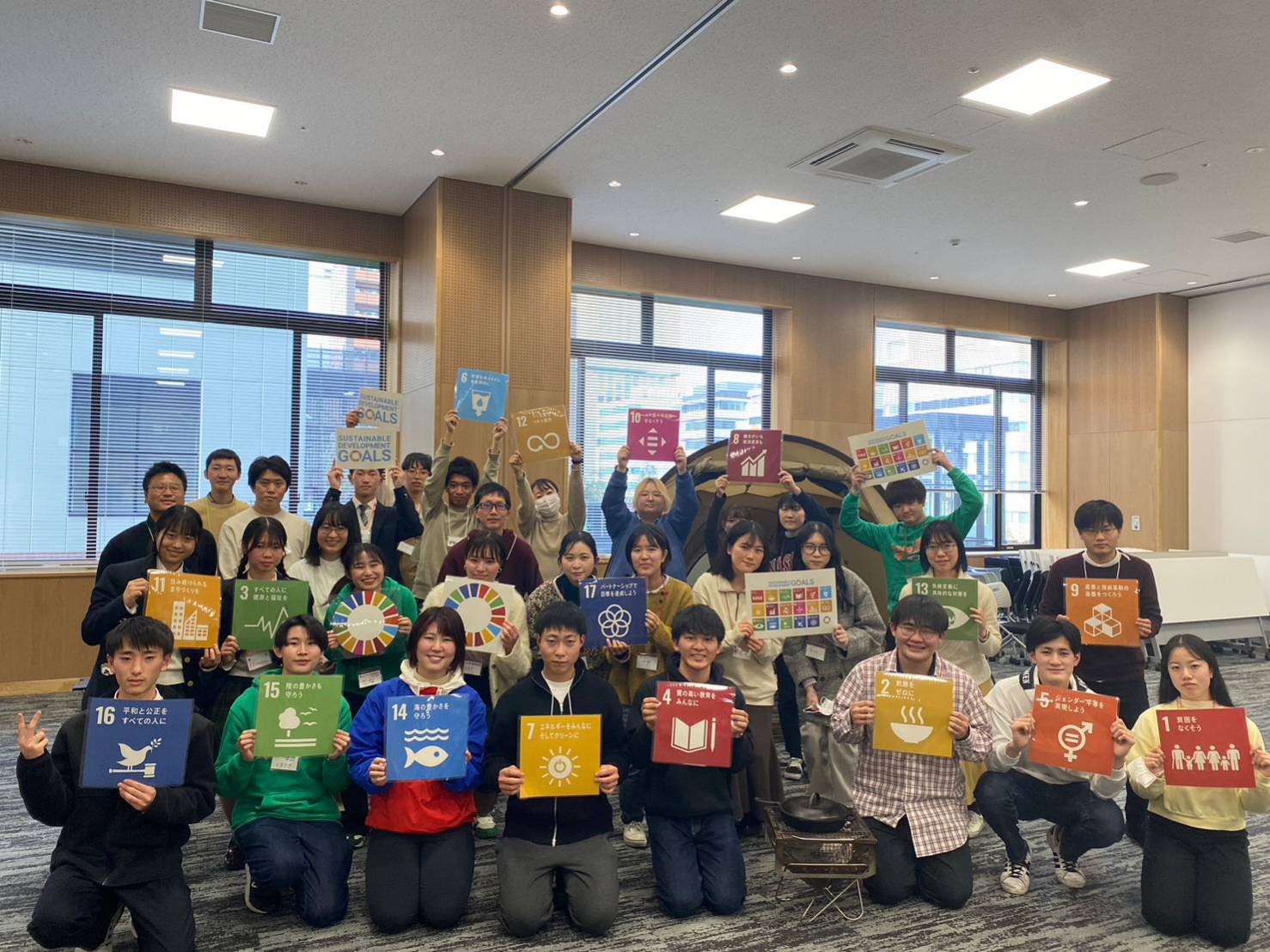
Participated in SDGs One-Day Youth Camp (organized by SDGs Network Okayama Youth Group)
――What do you value in your SDG activities?
It is to "act with consideration for others. I have often heard people say, "I have heard a lot about the SDGs, but I don't know what to do." For example, "Yes, there is Goal 3: Good health and wellbeing, but what exactly are the SDGs in blood donation?" "Is infection prevention even a part of the Goals?" "Is LGBTQ+ an SDG in the first place?". When I hear such voices, I sometimes think to myself, "What are the SDGs? Whenever I am unsure in this way, I always use as a criterion whether I am acting with consideration for others and whether I am helping someone on earth. For example, efforts to reduce food loss may be the result of caring about someone else, saying, "I think it would be sad if what producers and retailers work so hard to produce and sell is wasted or thrown away." I believe that caring for others and acting on those feelings are the SDGs.
However, it is very difficult to act with consideration for others, and there will always be differences with others. It is very tiring to wear out one's own heart from such differences.
The detective we often see in detective dramas who is working to catch criminals and protect the safety of citizens without regard for his family is wonderful, isn't he? But when a problem arises at home, the wife of the detective will say, "It's noble to help other people, but I want you to help my family, too." and that should be a problem. First of all, we need to establish the foundation of our own lives, and then expand our activities from the areas close to us, such as ourselves, our families, our local communities, Japan, the world, and the Earth, in order to make sustainable SDG activities possible. In my life, I have always felt that I am able to stand thanks to my family, and I am able to walk thanks to my friends and everyone who is involved with me. Therefore, I hope to take good care of myself and the people around me, and to act with consideration for others. And so that you too can act with consideration for others, I aspire to be flexible and supportive of a wide variety of people, and to work to remove obstacles, including mental obstacles.
――What specific activities would you like to engage in?
I would like to give high school students a campus tour that gives them the information they want, just as it is. As I mentioned earlier, I would like to work to remove as many obstacles as possible, and many students may feel a gap between their expectations and reality as they move from high school to college. The gap is feared to lead to burnout and early withdrawal from the university, such as "It wasn't supposed to be like this...". In order to avoid such a situation, it is necessary to obtain all the information you need about the university before enrolling so that you can match your ideals with the reality of the university and make a match so that you can truly say, "This is where I want to go to school, and this is the direction in which I want to lead my life. As a concrete measure to realize this, I am considering a tour of the campus and surrounding area with a small group of university students in the department and major of your choice. In a small group, students will be able to see each other eye to eye, which will make it easier for them to communicate with each other and to talk casually.
As a realization of this idea, the other day I am able to hold a campus tour of the Tsushima area with about 20 students attending Kurashiki Seiryo High School and 12 of our student volunteers. The high school students were unafraid to ask questions of their own, and the university students who responded to their questions sincerely conveyed their own thoughts and feelings to the high school students, expanding two-way communication in a lively manner. The high school students were able to see that their resolution to their future dreams had been raised, while the university students were able to see that the campus tour had given them an opportunity to become attached to and proud of themselves and their school, making me realize the significance and results of the campus tour.
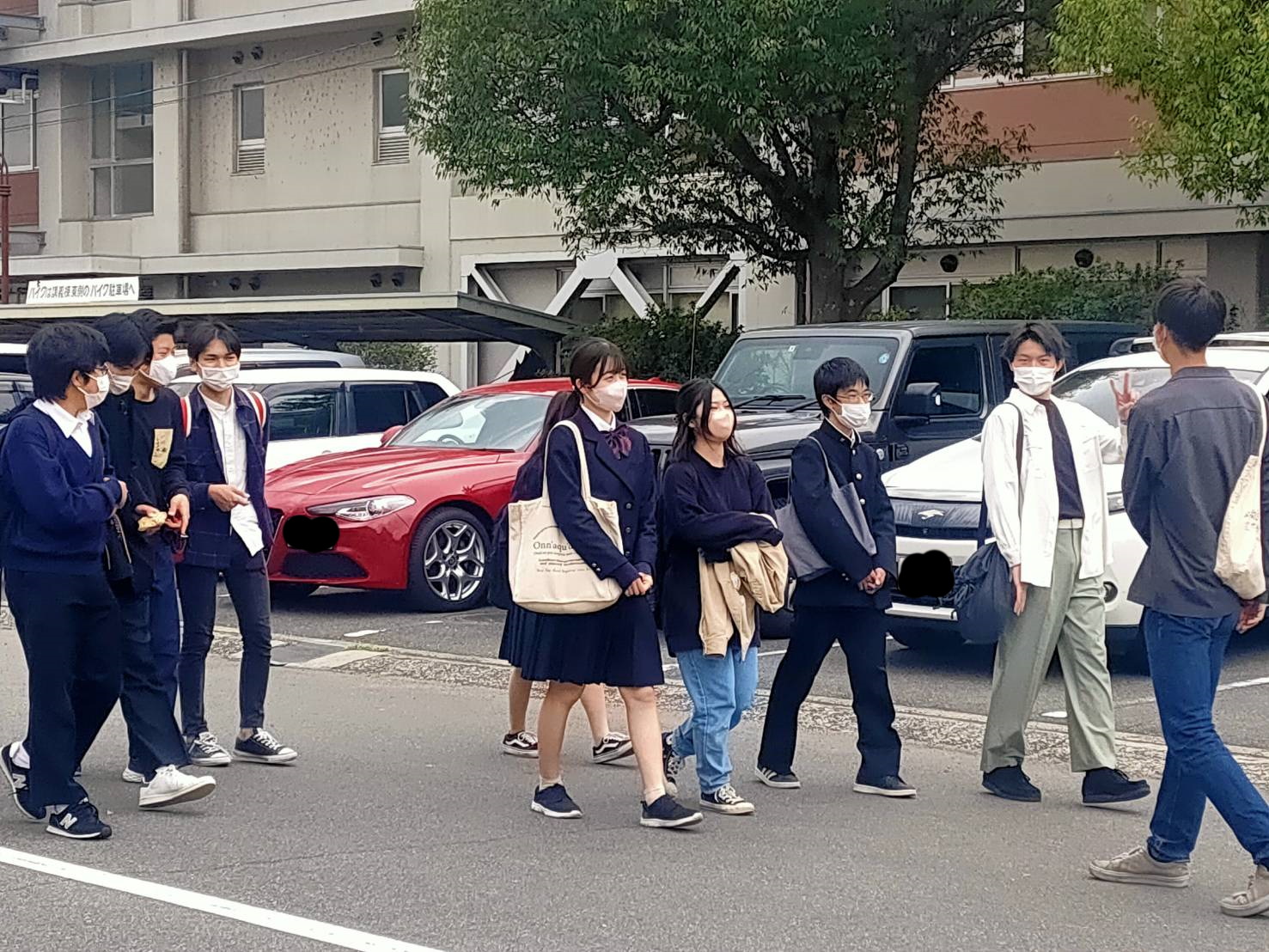
campus tour
――I could tell through our interview that you are now leading a very fulfilling life as a result of participating in Copain. This is a bit off topic, but did you choose Department of Nursing, Faculty of Health Sciences because you want to become a nurse in the future?
Nursing is wonderful and very attractive in the sense that you can help people and contribute to society. I am trying to enter the occupations related to nursing with a more SDG-oriented mindset to help people achieve what they want to achieve by removing obstacles that stand in their way. I also hope to play a part in alleviating the social problems that Japan is facing today, such as dementia and other problems of the elderly and the suicide rate among young people. Therefore, I chose to major in nursing in the hope that I could help someone recover from an injury of some kind, or support someone in doing something they want to do, so that no one on earth is left behind, and everyone can do what they want to do and be healthy in mind and body. Currently, not only in Japan, there is a great shortage of human resources. We are entering an era in which the world cannot be run by a single person in a single job. I have a dream to be active in society in a flexible and multi-faceted way, and to provide support to others.
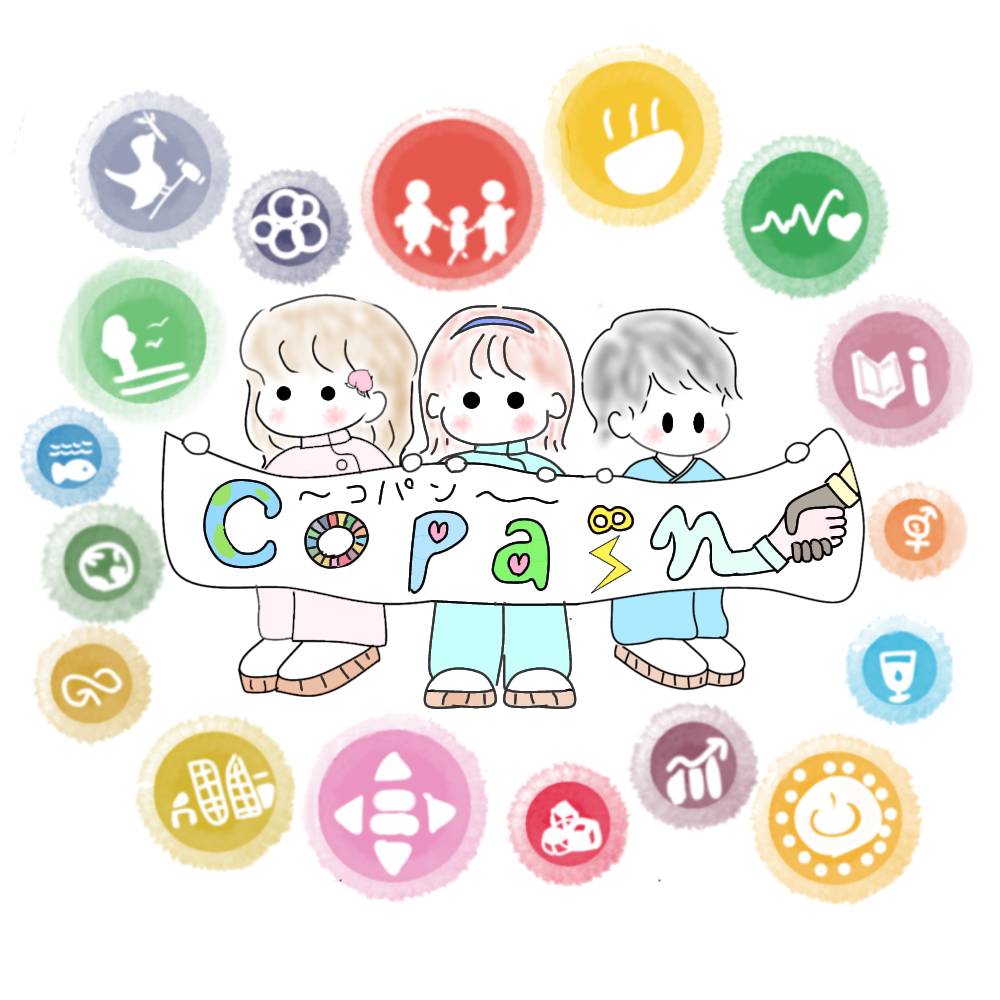
――It's a very nice dream! Finally, please give a message to everyone.
To those of you who have interviewed me and are reading this article, thank you for spending your valuable time with me. We are all crew members on a spaceship called Earth. Not only human beings, but also some 30 million other species of living creatures, each leading their own lives on this precious planet Earth, which is now suffering a great deal of pain and suffering as a result of humans alone doing as we please according to our desires. The word "copain" means "companion" in French. My interpretation of the word in English is "co-pain," which means "to bear the pain together”. The pain would be much less if it were shared by the entire crew, instead of being suffered only by the Earth, which has given us a wonderful natural setting for our activities, and which has a big pocketbook that never complains. The SDGs activities I am doing are things that others can do instead. And I believe that the accumulation of everyone's play is more powerful than the super play of an amazing person. Therefore, one step by one of us is more important than 1,000 steps by one person. The biggest SDG activity I am doing is to "never leave food uneaten. I encourage you to think of yourself and others, no matter how small, and take the first step toward action together, starting with us students at Okayama University. If you don't know what to do, please ask us anytime. Our watchword is "Copain"!
――Thank you very much, Mr. Morimoto!

“I want to be involved in a wide range of activities!” The encounter with Copain made this desire come true.

Online Meetings
――First of all, please tell us about the activities of Copain, the university approved organization of Okayama University SDGs Ambassador.
Copain started its activities in December 2021 with five members of the Faculty of Health Sciences, and has been developing its activities in many directions, starting with the "Beautiful Campus Project" launched with the desire to activate SDG activities on the Shikata Campus as on the Tsushima Campus. As of March 2023, there are a total of 13 members: 10 students from 3 majors (Nursing, Radiological Technology, and Medical Laboratory Science) in the School of Health Sciences, and 3 faculty members who participate as advisors (Professor Satoshi Hirohata, Dean of the Graduate School of Health Sciences, Professor Mori in the School of Health Sciences, and Professor Harada in the School of Interdisciplinary Science and Engineering in Health Systems)! In addition to monthly meetings, Copain members keep in touch with each other on a daily basis to plan projects and invite each other to volunteer. Last year, we created posters to prevent COVID-19 infection and to promote blood donation, discussed the importance of water using "WOSH," a circulating hand washing station donated to the university by WOTA, a company that has been sincerely addressing contemporary water issues, and participated in a reconstruction support festival in Mabi Town and an event organized by NPO "Dappi". We are actively participated in a wide range of activities.
――Thank you very much. Mr.Morimoto, please tell us why you joined Copain.
Because Copain is not a single, limited effort, but a wide variety of activities, and I felt that it was a good fit for me. To be honest, I did not engage in any social contribution activities during my elementary, junior high, and high school years, and if I had to say, the biggest social contribution I did was donating the change from my purchases at convenience stores to a donation box and greeting people in my community. When I traveled to Tokyo and Osaka after graduating from high school, I noticed many people doing various volunteer activities. At first, I was just impressed, "Wow, how can you do that?" But gradually, I began to think, "I want to be on the volunteer side, too, and be of service to others". I decided to volunteer when I entered university, and since Okayama University is famous for SDGs, I decided to join an organization that was involved in SDG activities. However, when I searched the Internet before entering the university, activities in the Shikata area did not come up in the results, so I considered joining an organization in the Tsushima area, but most of them were focused on a single goal, and I did not think I would be able to achieve my goal of "wanting to do a wide range of activities. This is because the SDGs do not have a single goal, but rather, all people, things, and the environment are intertwined and related, and a balanced consideration of all of them is necessary. When I was thinking about going it alone, I was introduced to the activities of Copain at the orientation for new students in the class of 2022 and thought, "This sounds fun! I can do what I want to do!" I felt that and I decided to join Copain. Now, thanks to the members of "Copain", the faculty, the people involved in Okayama University, and all the people I have met so far, I am able to do what I want to do, more than ever before, and I am having a great time.
The Beautiful Campus Project, an effort to raise awareness and interest in the SDGs

Mr. Morimoto presenting on the "Beautiful Campus Project
――What kind of activities is the "Beautiful Campus Project"?
Compared to the Tsushima area, the Shikata area is not as active in SDG activities, so we launched the "Beautiful Campus Project" in order to revitalize it, and we are continuing our activities on a daily basis. A "beautiful campus" means "a campus that is harmonious and pleasant for students to study there, and where students' minds and attitudes are favorable and idealistic toward a sustainable society. I interpret this in my own way in my "Copain" activities. People cannot be kind to others unless they have a certain amount of room in their hearts and minds. Therefore, I believe that if people have a relaxed and relaxed mind, social harmony will be achieved, and I believe that the "Beautiful Campus Project" is to support and encourage such a relaxed and relaxed mind.
Our goal in promoting the "Beautiful Campus Project" is to raise awareness and interest in the SDGs, which we believe will help people realize that they themselves are a part of society and act with a broader perspective.
There were three main activities conducted in the last fiscal year: first, we distributed e-mails and made posters targeting thorough preventive actions against COVID-19 infection at the Shikata campus; second, we conducted an educational activity using "WOSH," a water reuse hand-wash stand that can be installed in places without water, to reflect on the "importance of water" and The third activity was a blood donation drive, which is important as a foundation to support medical care.
――What did you do to make the poster for the call for prevention of COVID-19 infection?
The content of the poster was carefully considered so that it would be read by everyone, while showing concrete numbers of infected people and providing evidence, and also emphasizing the student's perspective. For example, instead of a one-sided appeal to prevent infections, we included a statement of the students' true feelings, such as "I am tired of living a life of self-restraint..." and "Thank you for your cooperation in preventing infections" to express their appreciation for the daily practice, and we aimed to create a poster that would be sympathetic to the students. The posters were distributed on the Okayama University website, in the Health Sciences Building, and on digital signage in the Shikata area, so that students would have as many opportunities as possible to see them. We learned about risk communication from our professors, and while thinking about it in our own way, we made these posters with a message that would resonate with students by keeping in mind the points to be considered.

the poster for the call for prevention of COVID-19 infection
――What is the "WOSH" a water reuse hand-wash stand?
It is a hand washing device that can be installed in places without running water with a single electrical outlet and circulates over 98% of the water used, on the spot, to wash hands and sterilize smart phones. This is currently located in a lab room on the 4th floor of the Health Sciences Building, so you may have seen or used it in your training. It is interesting that smartphones can be sterilized together, and I personally appreciate that it is useful in preventing COVID-19 and other infectious diseases.

the "WOSH" a water reuse hand-wash stand
――Why did you want to use WOSH?
There are two reasons; the first is to have access to clean water in times of disaster. During a disaster, there is an increased risk of infection and contamination because sanitary water is not available and people have more opportunities to wash their hands and eat with dirty water. "WOSH" is a stand-alone device that produces clean water as long as it has a power source, making it suitable for use in the event of a disaster.
Secondly, by using "WOSH," we want to make the issue of water, a precious resource, a personal matter for all of us and achieve Goals 6: "Clean water and sanitation. There are regions of the world that do not have access to clean water and are unable to prevent various infectious diseases due to washing hands with dirty water, while there are also numerous water problems, such as the use of large amounts of water in the production of denim. We hope that the installation of WOSH will help people learn about the world's water shortages, and encourage them to think again about the importance of using finite water carefully. WOSH has not yet been featured at any events, but we hope to use the WOSH at events for new students and other projects in the future to bring attention to infection prevention measures and the water issues facing the world.
――Please tell us about your blood donation activities.
To spread the word about blood donation activities, we first made an appeal on Instagram and bulletin boards. In particular, since our age group has the highest number of traffic accidents, we used blood donation promotional posters to call attention to the need for blood and why it is important to donate blood, including as a reminder of traffic accidents.
On September 13, 2022, the Okayama Red Cross Blood Center provided us with a blood donation bus and we were able to hold our own blood donation drive, which resulted in 31 people donating their blood. The fact that so many people were able to donate blood smoothly and without confusion was due to the efforts of the Student Blood Donor League, which called out for blood donations and helped with the reception desk. Blood donation is the foundation that supports medical care, and we consider it to be very important. If there is a shortage of blood donations, it is impossible to ensure safe medical care. As blood donors, it is important for us to recognize that we can play a part in supporting the medical field, and I strongly hope that we can continue to communicate the importance of blood donation in the future.

blood donation activities
――Why have you been able to engage in a variety of activities?
We have been able to promote various activities smoothly thanks to the knowledge and support of Professor Satoshi Hirohata, Dean of the Graduate School of Health Sciences, Professor Keiko Mori of the School of Health Sciences, and Professor Nahoko Harada of the School of Interdisciplinary Science and Engineering in Health Systems, who have joined "Copain" as our advisors. Thanks to the warm patronage of these professors and the outpouring of help and support, we have been able to do what we want to do, and we are truly grateful for their support. Currently, we are working with Professor Hirohata on a project to wrap the vending machines on the 4th floor of the Health Sciences Building with SDGs, and with Professor Mori on further plans to "Gardening and Maintenance" the area around the Health Sciences Building. We are working together with high school students to select flowers for this gardening project as a form of high school-university collaboration, and we are enthusiastically encouraging them to join us in planting and working together to improve our environment.

Maintenance around the Health Sciences Building
――Why with a high school student?
I believe that high school students are the brightest of all ages. I am interested in what high school students are doing in this sparkling, limited, and irreplaceable time that will determine the direction of their future lives. In addition, when I was a high school student, I was approached by a university student who knew something I did not know and whom I admired, and I have been longing for a place where I could engage in some kind of activity that would provide an opportunity to find an answer to the unidentified sense of dynamism in my heart. So, we are now calling on high school students in the hope of providing such a place for them. Talking with active high school students inspires us to do our best.
――I am very much looking forward to seeing the Shikata Campus becoming more beautiful in the future. How do you feel after the "Beautiful Campus Project" received the Encouragement Award of the FY2022 Okayama University SDGs President Award?
The first thing I felt was happiness. I was honestly happy that we were recognized, and originally, the purpose of our "Copain" project was to "spread and activate the SDGs in the Shikata area. I was happy to see that we are getting closer to achieving our goal. Also, at the award ceremony, I was greatly inspired by hearing about SDG activities at Okayama University, which I had never heard of before. It was a wonderful experience, and it inspired me to take on the next round of activities. I am filled with gratitude to all of you.
Realizing the results of activities and personal growth through involvement with a wide variety of people

the reconstruction support festival in Mabi Town
――Among the various activities you have been involved in, are there any activities that stand out for you?
Through the accumulation of activities at Copain, I have met a wide variety of people and am constantly learning and growing, so everything is impressive to me, but the one that immediately comes to mind is my participation in the reconstruction support festival in Mabi Town. At that time, due to the outbreak of COVID-19 infection, thorough precautions were taken to prevent the spread of infection on the medical school campus, making it difficult to conduct activities outside the campus, and there were few activities that involved dialogue with people other than Copain members, but this project was the first time I engaged in activities while interacting with local people. During the reconstruction support festival, we received words of thanks from various people, and they expressed their feelings toward the region, and for the first time since I entered Okayama University, I felt that I was being of use to others. Until then, it had been difficult for me to realize whether the number of people participating in our activities and the results of those activities were truly useful, and I was concerned that it was a one-way street on our side, but this activity in Mabi Town seemed to have cleared up the blur.
I also participated in a workshop on the SDGs, and as I listened to a wide variety of people's activities and thoughts on the SDGs, I felt my perspective gradually broaden. My own way of thinking became more flexible through the contact with everyone, and I felt as if I had solved a difficult problem and cleared up a lot of confusion that I had been feeling.
――What do you value in your relationships with various people?
It is to accept the person as he or she is, without denying or discriminating against them, saying, "There are people who think like this," or "There is such a way of thinking". By doing so, the prejudices and stereotypes I had have changed dramatically, my perspective has broadened, and I am now able to see things from multiple perspectives. I enjoy it very much because I can come up with new things I want to try and broaden the scope of my activities.
I believe that the SDGs are about "taking care of yourself and those around you, and acting with consideration for others”

Participated in SDGs One-Day Youth Camp (organized by SDGs Network Okayama Youth Group)
――What do you value in your SDG activities?
It is to "act with consideration for others. I have often heard people say, "I have heard a lot about the SDGs, but I don't know what to do." For example, "Yes, there is Goal 3: Good health and wellbeing, but what exactly are the SDGs in blood donation?" "Is infection prevention even a part of the Goals?" "Is LGBTQ+ an SDG in the first place?". When I hear such voices, I sometimes think to myself, "What are the SDGs? Whenever I am unsure in this way, I always use as a criterion whether I am acting with consideration for others and whether I am helping someone on earth. For example, efforts to reduce food loss may be the result of caring about someone else, saying, "I think it would be sad if what producers and retailers work so hard to produce and sell is wasted or thrown away." I believe that caring for others and acting on those feelings are the SDGs.
However, it is very difficult to act with consideration for others, and there will always be differences with others. It is very tiring to wear out one's own heart from such differences.
The detective we often see in detective dramas who is working to catch criminals and protect the safety of citizens without regard for his family is wonderful, isn't he? But when a problem arises at home, the wife of the detective will say, "It's noble to help other people, but I want you to help my family, too." and that should be a problem. First of all, we need to establish the foundation of our own lives, and then expand our activities from the areas close to us, such as ourselves, our families, our local communities, Japan, the world, and the Earth, in order to make sustainable SDG activities possible. In my life, I have always felt that I am able to stand thanks to my family, and I am able to walk thanks to my friends and everyone who is involved with me. Therefore, I hope to take good care of myself and the people around me, and to act with consideration for others. And so that you too can act with consideration for others, I aspire to be flexible and supportive of a wide variety of people, and to work to remove obstacles, including mental obstacles.
――What specific activities would you like to engage in?
I would like to give high school students a campus tour that gives them the information they want, just as it is. As I mentioned earlier, I would like to work to remove as many obstacles as possible, and many students may feel a gap between their expectations and reality as they move from high school to college. The gap is feared to lead to burnout and early withdrawal from the university, such as "It wasn't supposed to be like this...". In order to avoid such a situation, it is necessary to obtain all the information you need about the university before enrolling so that you can match your ideals with the reality of the university and make a match so that you can truly say, "This is where I want to go to school, and this is the direction in which I want to lead my life. As a concrete measure to realize this, I am considering a tour of the campus and surrounding area with a small group of university students in the department and major of your choice. In a small group, students will be able to see each other eye to eye, which will make it easier for them to communicate with each other and to talk casually.
As a realization of this idea, the other day I am able to hold a campus tour of the Tsushima area with about 20 students attending Kurashiki Seiryo High School and 12 of our student volunteers. The high school students were unafraid to ask questions of their own, and the university students who responded to their questions sincerely conveyed their own thoughts and feelings to the high school students, expanding two-way communication in a lively manner. The high school students were able to see that their resolution to their future dreams had been raised, while the university students were able to see that the campus tour had given them an opportunity to become attached to and proud of themselves and their school, making me realize the significance and results of the campus tour.

campus tour
One step by a thousand of us is a greater power to save the earth than a thousand steps by one person
――I could tell through our interview that you are now leading a very fulfilling life as a result of participating in Copain. This is a bit off topic, but did you choose Department of Nursing, Faculty of Health Sciences because you want to become a nurse in the future?Nursing is wonderful and very attractive in the sense that you can help people and contribute to society. I am trying to enter the occupations related to nursing with a more SDG-oriented mindset to help people achieve what they want to achieve by removing obstacles that stand in their way. I also hope to play a part in alleviating the social problems that Japan is facing today, such as dementia and other problems of the elderly and the suicide rate among young people. Therefore, I chose to major in nursing in the hope that I could help someone recover from an injury of some kind, or support someone in doing something they want to do, so that no one on earth is left behind, and everyone can do what they want to do and be healthy in mind and body. Currently, not only in Japan, there is a great shortage of human resources. We are entering an era in which the world cannot be run by a single person in a single job. I have a dream to be active in society in a flexible and multi-faceted way, and to provide support to others.

――It's a very nice dream! Finally, please give a message to everyone.
To those of you who have interviewed me and are reading this article, thank you for spending your valuable time with me. We are all crew members on a spaceship called Earth. Not only human beings, but also some 30 million other species of living creatures, each leading their own lives on this precious planet Earth, which is now suffering a great deal of pain and suffering as a result of humans alone doing as we please according to our desires. The word "copain" means "companion" in French. My interpretation of the word in English is "co-pain," which means "to bear the pain together”. The pain would be much less if it were shared by the entire crew, instead of being suffered only by the Earth, which has given us a wonderful natural setting for our activities, and which has a big pocketbook that never complains. The SDGs activities I am doing are things that others can do instead. And I believe that the accumulation of everyone's play is more powerful than the super play of an amazing person. Therefore, one step by one of us is more important than 1,000 steps by one person. The biggest SDG activity I am doing is to "never leave food uneaten. I encourage you to think of yourself and others, no matter how small, and take the first step toward action together, starting with us students at Okayama University. If you don't know what to do, please ask us anytime. Our watchword is "Copain"!
――Thank you very much, Mr. Morimoto!

Copan members
